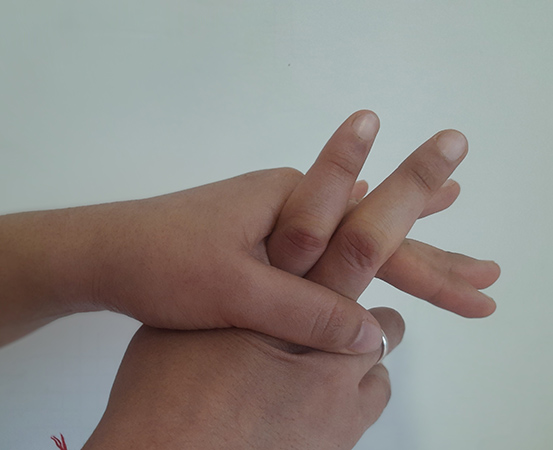
Can you recall the unconscious habits you do when you are stressed, anxious or even bored? It could be biting your fingernails, running your fingers through your hair, or even tapping your feet but the one common habit that most people have is to crack their knuckles.
While it could be stress relieving for the ones doing it, people around them may find it annoying. Whether soothing or irritating, the sound of knuckle cracking often turns into a discussion on whether it is safe or harmful.
The science behind knuckle cracking
“Knuckle cracking is stretching our bones, muscles and ligaments around the small joints of the hands; it creates a cracking sound,” says Dr Ravikumar Mukartihal, consultant orthopaedic and joint replacement Surgeon, Sparsh Hospital, Bengaluru.
Dr Mukartihal says that in our small joints, there is something called the ‘synovial fluid’ (a fluid which reduces friction between the articular cartilage of synovial joints during movement) which acts as a lubricant.
“When we crack our knuckles, the synovial fluid will form a bubble and burst due to the pressure of the surrounding ligament, stretching of the bones and pressure created in the small joint. The bursting of the bubble causes the sound,” he says.
Dr Mukartihal adds, “there is also a theory which says that the nitrogen oxide in the knuckle gets absorbed in the joint which makes the sound. In one of the studies mentioned in the journal of medicine, it is said that when an individual does any sort of rapid stretching of the ligaments, the intra-articular adhesions are broken which then leads to a formation of a bubble in the joint; it then expands and results in a sound like cracking.”
Why do people crack their knuckles?
Dr Abhijeet V Savadekar, consulting orthopaedic surgeon at Jaslok Hospital, Mumbai says that some people crack their knuckles when are nervous or bored. “It is very common for people to do it when sitting idle and feel like relaxing. Some people enjoy the sensation of cracking noise and feel the release of pressure. While some feel it is stress relieving, some may not. However, there are no studies that say it helps in relieving stress,” he says.
Dr Mukartihal explains the role of endorphins every time we crack our knuckles.
“Whenever we stretch ligaments and tendons around the muscle, it leads to a release of endorphins, a neurotransmitter from the pituitary gland in the brain. Endorphins are said to make a person feel calm. Hence, when we stretch and crack a knuckle, psychologically the sound caused by it gives a relief,” says Dr Mukartihal.
READ MORE:
Tinnitus makes people yearn for sound of silence
Don’t let others crack your knuckles
Dr Savadekar says that it has no side effects and there are many studies which prove this. “It is a normal phenomenon. However, if someone else is trying to crack your knuckles and try to do it forcefully, there are chances of damaging the joints. It is always best to do it on your own to prevent damaging your joints,” he says.
Is too much harmful?
Dr Mukartihal says that it has neither any side effects nor any benefits. But he also points out that any habit in excess is bad and the same goes for knuckle cracking. Talking about myths, he says that people believe that too much of cracking would lead to arthritis. But it has no scientific backing.
“People who get annoyed may say that the person cracking knuckles could end up weakening their bones which is not true. It will not lead to weaker joints. There are no studies which point out the harmful effects of knuckle cracking,” says Dr Savadekar, adding that if cracking one’s knuckle makes people feel good, then they should do it.
How long before you can get cracking again?
Dr Savadekar says, “once you crack your knuckles, it takes about 20 to 30 minutes for you to crack your knuckles again as the air bubble that forms to crack a knuckle takes about that much time to form.”
Not everything sounds the same
Sometimes, people experience the sound of cracking from the smaller joints of their hands without cracking them, but they are not as loud as knuckle cracking.
Dr Savadekar explains the involuntary sound from smaller joints and says, “when you’re trying to hold something or make a fist, you hear a cracking sound which is not as loud as knuckle cracking. But it is also a form of cracking as this too has the same mechanism. When you’re trying to hold something with a tight fist, it causes a change in pressure which leads to gas release and the bubble bursts. The only difference is when you crack your knuckles you do it voluntarily but here you do it involuntarily.”
Can you crack all the joints?
There are so many joints in our body, but we can’t crack all of them.
“You can’t crack all the joints such as the neck, leg, knee and shoulders like you do with your knuckles. This is because the pressure that is required for cracking your knuckles is possible only in your finger and toe joints and not possible in the larger joints. Therefore, the cracking happens only in your fingers and toes joints,” says Dr Savadekar.
Sound from other joints
Dr Savadekar explains that the cracking of neck joints or sounds created from other joints are completely different from the cracking sound of knuckles. “That sound is called snapping of the joints. In these joints, sounds are created because of the friction of the bones or rubbing of the bones against each other. This sound is caused due to friction and not due to the bursting of the bubble,” he explains.
















2 Responses
Had no idea forcefully cracking my knuckles is harmful!
Hey I’m always cracking my knuckles..wish I’d read this earlier..